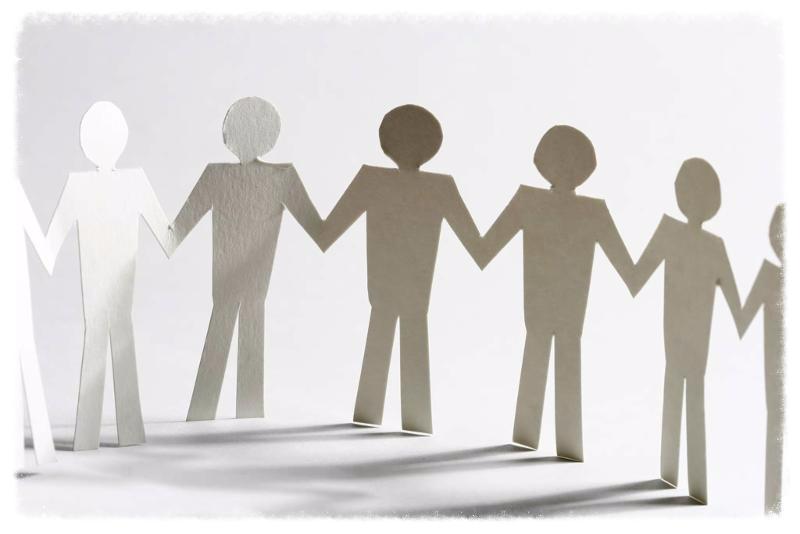We all have a variety of personas we use in various life situations. We behave differently based on our audience, the environment, and the feedback we receive. Even our appearance will change based on where we are and with whom we are spending time. A person's behavior tends to be quite different while attending a worship service versus having a close friend over to watch a hotly contested ballgame. A key difficulty with dementia is that the person's ability to successfully interpret the environment and select and perform the socially acceptable role is gradually lost. The loss leaves only the private self on view at all times resulting in behaviors that others find irritating and problematic in public situations.
The purpose of this article is four fold. The primary purpose is to discuss the various selves we use. Second, we will identify how we typically determine which self to show in differing situations. Then we will describe the impact of dementia on one's ability to choose between our different selves. Finally, we will identify strategies that may be helpful in training staff and family in coping with the problems inherent with this loss.
There are generally four different selves we portray in our lives. They are the community self, the worker self, the home self, and the private self. For each of these we have a different set of behaviors, clothing, activities, and language.
O
ur community self is generally our most polite and potentially artificial self. It is developed throughout our life and generally guided by parents, teachers, and social norms. When we are in this role we tend to wait in line, hold doors open for others, and maybe most importantly, bite their tongues when they have a thought that isn't socially acceptable to share.
Our worker self is often similar to our community self; however, it tends to be more focused as well as filtered. Our behavior related to this self centers more around the interactions with, and expectations of, supervisors, colleagues, and possibly customers.
Our home self is a more relaxed version that we share with those we are most comfortable with; this could possibly include family members and close friends. This self

tends to be less filtered and you may say things that your community self
or worker self would find too risqué. You do this
because you are with people who know you best and accept your words and actions without being offended or turned off.
Our private self is our most honest and comfortable self. We typically only use this self when we are truly alone and therefore no one can
judge us. This self may walk around the house in little to no clothing, drink straight from the bottle, or say anything that comes to mind.
So how do we determine which self to use? We interpret the environment using our five senses and memories of similar experiences and what was expected. We engage our pre-frontal cortex which regulates impulse control, allows us to make decisions, and be logical, reasonable, and rational. In addition, the pre-frontal cortex allows us to be aware of ourselves but also to see the perspective of others. Our memories and thinking skills allow us to determine the presence of others, the identity of these people, the meaning of their non-verbal behaviors, the meaning of their words
, and their tone of voice. These abilities also help us identify which activities could or should be done here, the types of things we have done here before, and our emotional responses to these activities. Once we figure all of this out, we select our persona and put it on. We then function as that self until there are cues and information indicate that we should change which self we are using.
So what goes wrong with this system when dementia strikes? In order to understand how the two issues are related it is important to review some of the key features of most dementias.
Difficulty with impulse control, immediate memory and recall, problems with language interpretation and abstract comprehension, difficulty with higher order problem solving skills, and impairment of mental flexibility are all hallmarks of early dementia.
The person can't always restrain the desire to say or do what they would like rather than what is socially expected of them. The person does not get the message being sent in the words and phrases being used due to inaccurate or inadequate connections between semantic memories and the current event. The person can no longer reason through a complex social situation or unfamiliar environment and so makes errors in behavior based on partial understanding or faulty cause and effect reasoning. As the brain is being destroyed, the person loses the ability to look at the situation from multiple viewpoints as well as the ability to take familiar information and reorganize it and categorize it in a new or unusual way. The result is that the person is forced to use only the more routine and familiar responses regardless of the situation due to an inability to be flexible.
As the disease progresses these deficits in function become more and more pronounced. Additionally, long-term memories become less available and accurate. The ability to distinguish actual historic events from what might have been wished for or dreamed of is greatly diminished and the person begins to confabulate. The person is also experiencing impairments in visual perception and auditory comprehension that
affect everything they see and hear. The more basic cognitive functions also begin to deteriorate at this time. Attention and concentration are impacted. This makes it difficult for the person to remain focused resulting in distractibility or inattentiveness to the most important facets of the environment or situation. It also makes it problematic to change the focus of attention or activity, resulting in perseveration and repetitive behaviors and actions, or lack of initiation.

These changes eventually destroy the ability to recognize people, places, objects, familiar routines, and consequently what should be done where, when, and with whom. The ability to select which self to use when is affected. One of first behaviors that causes concern is a person will display inappropriate behavior in public places. They may be at a luncheon and talk about how boring the speaker is, even though the speaker is within earshot. They may describe their caregiver as "that fat girl, over there". They might tell their spouse of 40 years, "I wish you would go home because I want to watch this show and you are bothering me". In other words, I no longer can recall and adhere to the rules of politeness. As the disease progresses, it becomes more and more difficult for me to figure out which self to use and it also becomes more difficult to sustain a public or work self for any length of time due to worsening impulse control and decreasing interpretative skills. If I can't recognize you as my daughter, I will not take on my family self. If I have been using my private self, I may continue to use it in a very public situation. In this case, I may reach across the table to take your dessert because I don't see mine or because I ate mine and would like some more.
It is at this stage we often hear family members and caregivers say that their loved one would never have done something like this. We hear that this person was always very soft spoken and gentle and never yelled, swore, or got angry at anyone, no matter what. In these cases, it is probable that the person had these thoughts and was able to control them or, when in the privacy or his or her own space, did have these very reactions, BUT that he or she never let it show in any other situation. With the onset of the disease, however, the person is no longer able to contain those words, thoughts, feelings, and reactions and they are now being used in family, work, and public situations. On the other hand, the person who had the greatest consistency between his or her private self and family, work, and public selves will tend to have the least change in behavior. In these situations
, we typically hear family members and caregivers say "she has always been that way" or "that's just mama, she's like that".
Tips for care partners and family members to improve the quality of life for the Person Living With Dementia (PLWD):
- Improve the cues and make cues stronger and more consistent
- If going out for lunch - put on dress up clothes and go to a quiet place
- If bathing - have a warm comfortable space, use other familiar and habitual routines to lead up to the event, keep your tone and approach friendly and intimate
- Reduce the number and frequency of role change demands
- Use our selves to foster the use of theirs
- Provide opportunities for using these selves
- Use valued cues to elicit the self most desired in the situation
- When the public, work, or family self becomes unusable - stop setting up situations that require one of them and then becoming frustrated when the person is not able to perform
- ALWAYS respect the person and appreciate the unique self you are seeing and experiencing
Tips for family members and caregivers to understand what is happening:
- Knowledge is the key to stress reduction. Use the following simulation to help get an appreciation for the different selves you have and use almost effortlessly
- Recognize the changes that happen when someone develops dementia and how this might impact expectations, interactions, interests, relationships, and outcomes.
- Imagine the value and importance of various cues, props, and environmental supports in helping or hindering various self-expressions when internal systems are failing. Learning to match what care partners would like to see with cues that foster those performances are essential
- Talk openly about the need to reduce the demand for using the selves the person may no longer be able to master as the disease progresses
Consider the following
activity in order to better understand how hidden aspects of your

personality or situation-driven behaviors may impact what people think you about you versus what you believe or know about yourself. Complete the questionnaire from four different points of view.
- Work with someone you have never met before to fill out the sheet, knowing it will be shared with a large group of people you don't know at all.
- Work with a co-worker of colleague to fill out the sheet, knowing it will be shared with the rest of the workplace personnel
- Work with a spouse, close friend or significant other to fill out the sheet, knowing only the two of you would ever see it
- Complete the sheet for yourself - no one else will ever see it or hear about it, but it affects how you will spend the rest of your life so be as honest as you can
Talk with someone or think about how answers varied, how your emotions and affect changed, how your language altered, and consider how many times you might have indicated "well it depends" - what does this mean for the person living with dementia and others around them?
What if YOU were to develop dementia? Think about the value of the old saying
"...to thine own self be true...thou canst not then be false to any man." (Shakespeare)
In other words, practice being yourself now. Pay now or pay later.